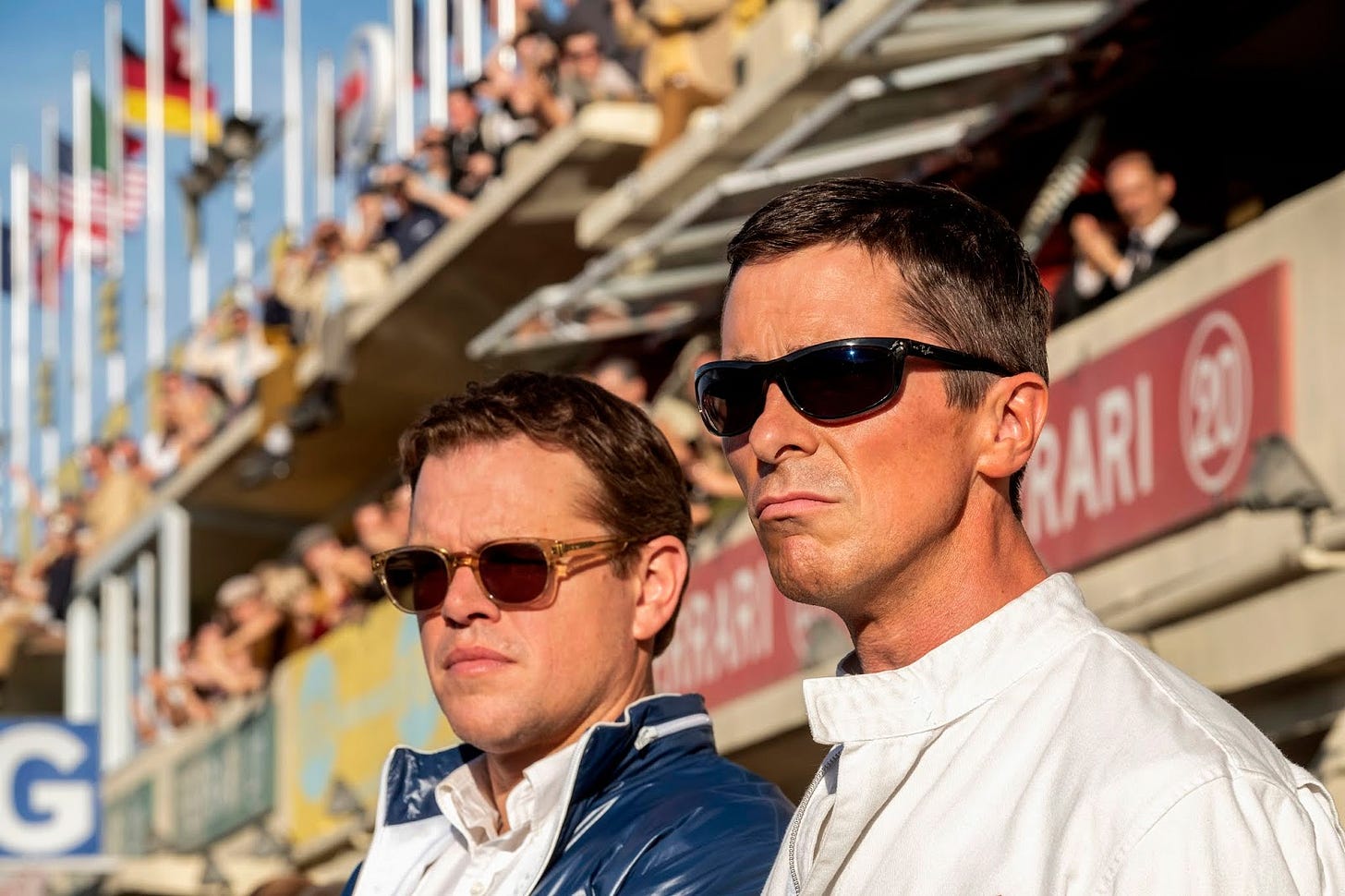Ford v Ferrari (2019)

Moving rating: 7/10
Car racing doesn’t really interest me. It’s a testament to Ford v Ferrari that the film got me invested in the outcome of the 1966 24 Hours of Le Mans race, a competition I was totally unfamiliar with beforehand. Based on historical events, the movie is directed by James Mangold and tells the story of automobile designer Caroll Shelby (Matt Damon) and legendary race car driver Ken Miles (Christian Bale), who are recruited by Ford Motor Company executives Henry Ford II (Tracy Letts) and Lee Iacocca (Jon Bernthal) to build the Ford GT40 and defeat the heretofore dominant Ferrari team.
In essence, it’s a battle between the Americans and their British partners against the rising threat of their Italian competitors. The race itself is a metaphor for a larger cultural battle in the 1960s between Americans and Europeans, as Iacocca makes clear early on in a boardroom presentation. The Ford Motor Company fears that it’s losing its market dominance and is seen as uncool to the maturing baby boom generation:
Lee Iacocca: In 1945, our soldiers came home. What was the first thing they did? They had sex. Seventeen years later, those babies, they’ve grown and they’ve got jobs. They’ve got licenses, but they do not wanna drive the same dull ‘50s cars their parents drove. You see, kids today, they want glamour. They want sex appeal. They want to go fast. Gentlemen, it’s time for the Ford Motor Company to go racing.
Henry Ford II: We’re already in racing, Iacocca.
Lee Iacocca: NASCAR? It’s, it’s regional, sir. If you go to the movies, you open up a magazine, you don’t see good ‘ol boys and Winston-Salem. You see, uh, Sophia Loren, Monica Vitti. James Bond does not drive a Ford, sir.
Henry Ford II: That’s because he’s a degenerate.
Leo Beebe: Lee, in the last three years, you and your marketing team have presided over the worst sales slump in the US history. Why exactly should Mr. Ford listen to you?
Lee Iacocca: Because we’ve been thinking wrong. Ferrari. Now, they have won four out of the last five Le Mans. We need to think like Ferrari.
In some ways this film reminded me of Moneyball, which also looks at competitive sports through the lens of big business. Winning, in each case, is a way for a major corporation to improve the attractiveness of its brand and boost profits. In order to win, the company brings in a ringer, someone who can think outside the box and offer an innovative path to victory. In Moneyball it was assistant general manager Peter Brand who used sabermetrics to make the Oakland Athletics a winning team. In Ford v Ferrari it’s the duo of Shelby and Miles, who know how to design a fast car and win a race at the level of Le Mans.
Miles is depicted in the film as the car whisperer, as the Man Who Knows Cars. He knows automobiles inside and out. He can listen to a car he’s driving and feel what it’s capable of. He even speaks to the car as he’s driving it, coaxing it to give him more than 7000 RPMs. Ken teaches everything he knows to his son, the Wolfgang Van Halen to his Eddie. Shelby is Miles’s champion, defending him before skeptical Ford executives. He knows Miles is the “best of the best”, in classic Hollywood action hero tradition, though it takes the execs a while to share his view.
The most popular car-related films at the moment are of course the Fast and Furious movies. In The Fate of the Furious Vin Diesel’s Dom Toretto memorably mumbled, “You know it doesn’t matter what’s under the hood. The only thing that matters is who’s behind the wheel.” Shelby half-shares this view. As a car designer, he acknowledges what’s under the hood does matter. But as he suggests to Iacocca early on, the best car that money can buy means nothing without the right driver:
Lee Iacocca: So you don’t think that Ford Motor Company can build the greatest race car the world’s ever seen? You think that we are incapable of winning an event like that? Even if we had a brilliant partner? Even if we wrote a, uh, blank check?
Carroll Shelby: What I’m saying is, you can’t buy a win, Lee. But maybe you can buy the guy who gets you a shot.
Building up the mystique of racing in this way, presenting an almost spiritual bond between race car and driver, managed to draw me in and get me interested in a sport I otherwise couldn’t care less about. It’s very much a “guy’s movie”: the only female character is Miles’s wife Mollie (Caitríona Balfe) who mostly acts concerned and supports her husband. Mangold shoots the race scenes in an exciting fashion, the actors offer good performances, and there’s enough care to period detail in the music and production design that the film keeps your attention throughout its considerable 152-minute length. If it wasn’t enough to turn me into a fan of sports car racing, it was entertaining enough to pique my interest and give that subculture another look.



